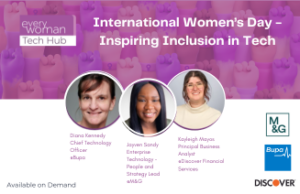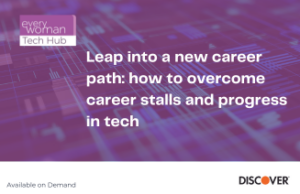
Are you taking care of your career wellbeing? We all know that working on your professional and personal growth is important, whether that’s boosting your confidence, sharpening up technical skills or refining your leadership abilities. But it’s easy to let this fall to the bottom of the list amid your busy daily working life.
Developing your potential and futureproofing your career to meet the demands of constant change and longevity in the modern workplace requires your focus. And while your manager might provide a framework for that growth, you are ultimately the catalyst for your career and the only person that can make sure it gets a regular MOT. Thinking of self-development as a multifaceted journey is key, and that should be reflected in your approach, which can be formal, informal or a mix of elements. It’s also important to remember that growth and development are not necessarily just about making change; they might also be about maximising opportunities in how you currently work and what you do to invest in yourself.
BUPA’s Charlotte Davis and Julie Stott discuss the ways you can prioritise career development naturally in your daily life — and give your career the power up it deserves.
TAKE A NORTH STAR APPROACH
Your ultimate goal should be your guiding light — in essence, you need to determine what your vision is, what’s important to you and what you want to get out of work, says Charlotte Davis, Group Head of Operational Resilience. Everyone has a different view of what really matters to them and exploring this anchor is not so much about considering your destination, as finding your way through your values, inspirations and needs — a ‘North Star’ to follow, which, once identified, will give you aligned actions to enable forwards momentum.
HOW TO DO IT: ‘Think about the five components of motivation, work, status/reward, environment, and wilder life goals, and write down what each of these mean to you. That will give you a sense of direction,’ says Charlotte. Think about it less in the context of a role, but more around what you do: the type of work, how you deliver it, what you want more of and less of, and what makes you feel as if you are fulfilling your potential. This will uncover your intrinsic motivation and clarity your ‘North Star’ to follow.
NUDGE OUT OF YOUR COMFORT ZONE
You need to start feeling comfortable — such as through online courses or reading books — to help you gain the confidence and perspective to increase self-awareness and take calculated risks. ‘We use Insights Discovery colour energy tool for behaviour modelling in Bupa, which is really effective in holding a mirror up,’ says Julie. She also suggests powering up by seeking out constructive feedback from trusted people, something that isn’t always easy to listen to but, again, offers another point at which to become comfortable feeeling uncomfortable and move forward.
IT’S A MARATHON, NOT A SPRINT
‘Self-development isn’t one ‘one-trick pony,’, notes Julie. ‘We can’t take one technical or power skills course, pat ourselves on the back and claim to have skills badge for life. This is a continuous process that demands continuous process that demands continuous learning and continuous self-investment.’ With many industries, functions and roles changing at pace, being proactive about setting and reviewing goals and the personal development needed to meet them is key to staying current, she notes — both with our careers but also with ourselves and our ambitions.
HOW TO DO IT: ‘Align your goals where possible to your team or business strategy, and then proactively share them with your team and your manager to make yourself accountable’, says Julie. This creates investment in success outside of yourself — and you’re more likely to apply yourself when other people are going to hold you to account.
DEVELOP A HEALTHY SELFISHNESS
‘Self-development is often the first thing to be dropped when we get dropped when we get busy or have additional pressures at work.’ says Julie. ‘Pushing back on this in of itself can be a point of personal development and prioritising this transformative ‘important but not urgent’ area, identified by Steven Covey in his classic book The 7 Habits of Highly Effective People. Within that, developing a healthy ‘selfishness’ that can help you to stay on track. That means only saying yes to the right things — those aligned to your plan or your ambition. By not saying yes to everything, you conserve energy, create focus and liberate time to work on your self-development.
HOW TO DO IT: Create a contract with yourself around how much time you will invest in self-development, and ring-fence that in your diary. And remember that self-development investment comes in many different forms, not just self-paced, online learning, so explore all the different ways in which you can develop your skills or network at work and outside.
CONSIDER ALL THE MANY WAYS YOU CAN LEARN
Time and energy are precious, so consider which skills will have the best return on investment for you, and your ambitions. ‘The way in which we approach skill development has changed as a result of the modern landscape,’ notes Julie. ‘We’re moving away from a conventional, ‘just-in-case’ learning mindset that has a ‘work, stop learn, go back to work’ approach and can now use our digital environments to really zero in on what we need to learn at a time to suit us and integrate it in our daily life.’
HOW TO DO IT: Digital resources such as those on the everywoman in Tech Hub and the everywomanNetwork are incredibly powerful in boosting your professional and personal development in your own time and at your own pace. Beyond that, think about the type of experiences you need that will help you grow relevant skills and knowledge and the different ways in which you might find those; perhaps through putting your hand up for a project, a secondment or shadowing; or perhaps through experiences outside work such as volunteering.
EXPLORE A MILLION PATHWAYS
‘Sucess and what defines it is really personal toyou,’ says Charlotte, who notes that self-awareness is again key here. She suggest checking in with yourself, asking ‘What is my target?’, ‘What do I want to achieve now?’, and continually updating your North Star. ‘The corporate sucess ladderr makes me think of a single track of advancement and success or indeed failure, and the modern world of careers and development is more fluid,’ adds Julie. ‘There are million pathways we can take to achieve our versions of success and for me this is where resilience and our ability to be tenacious really comes into play.’
HOW TO DO IT: Don’t be afraid to take sideways or even a backwards step to move forward ultimtately in your career. ‘I realised if I wanted to step into a large organisation, such as Bupa, I needed more experience in terms of my operational HR abilities. I decided to take a step down from a board and into a delivery partner role with Bupa dental,’ says Julie. ‘My current role presented itself because of that journey and I would not be equipped to be where I am today without having taken that backward step.’



